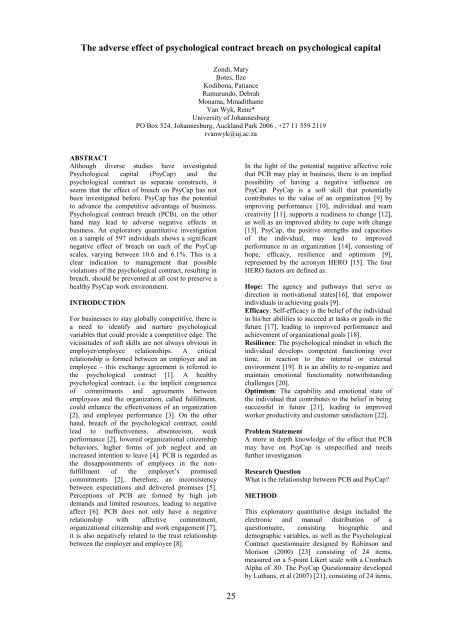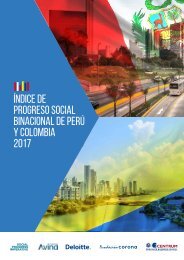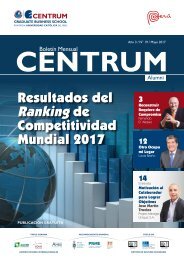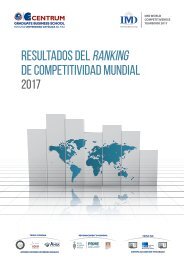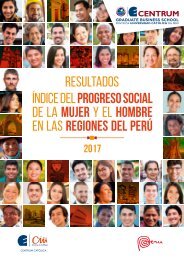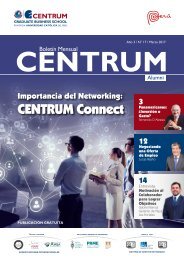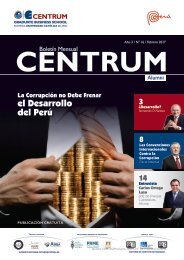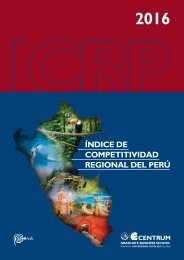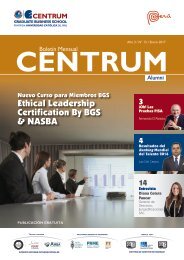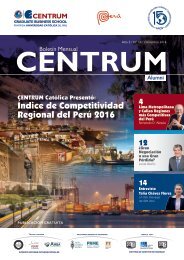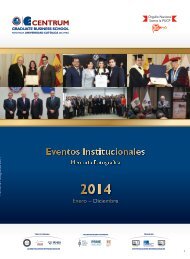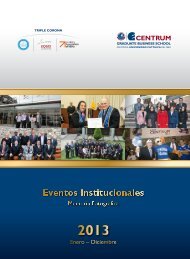Pan-Pacific Conference XXXIV. Designing New Business Models in Developing Economies
This publication represents the Proceedings of the 34th Annual Pan-Pacific Conference being held in Lima, Peru May 29-31, 2017. The Pan-Pacific Conference has served as an important forum for the exchange of ideas and information for promoting understanding and cooperation among the peoples of the world since 1984. Last year, we had a memorable conference in Miri, Malaysia, in cooperation with Curtin University Sarawak, under the theme of “Building a Smart Society through Innovation and Co-creation.” Professor Pauline Ho served as Chair of the Local Organizing Committee, with strong leadership support of Pro Vice-Chancellor Professor Jim Mienczakowski and Dean Jonathan Winterton.
This publication represents the Proceedings of the 34th Annual Pan-Pacific Conference being held in Lima, Peru May 29-31, 2017. The Pan-Pacific Conference has served as an important forum for the exchange of ideas and information for promoting understanding and cooperation among the peoples of the world since 1984. Last year, we had a memorable conference in Miri, Malaysia, in cooperation with Curtin University Sarawak, under the theme of “Building a Smart Society through Innovation and Co-creation.” Professor Pauline Ho served as Chair of the Local Organizing Committee, with strong leadership support of Pro Vice-Chancellor Professor Jim Mienczakowski and Dean Jonathan Winterton.
Create successful ePaper yourself
Turn your PDF publications into a flip-book with our unique Google optimized e-Paper software.
The adverse effect of psychological contract breach on psychological capital<br />
Zondi, Mary<br />
Botes, Ilze<br />
Kodibona, Patiance<br />
Ramurundo, Debrah<br />
Monama, Mmadithame<br />
Van Wyk, Rene*<br />
University of Johannesburg<br />
PO Box 524, Johannesburg, Auckland Park 2006 , +27 11 559 2119<br />
rvanwyk@uj.ac.za<br />
ABSTRACT<br />
Although diverse studies have <strong>in</strong>vestigated<br />
Psychological capital (PsyCap) and the<br />
psychological contract as separate constructs, it<br />
seems that the effect of breach on PsyCap has not<br />
been <strong>in</strong>vestigated before. PsyCap has the potential<br />
to advance the competitive advantage of bus<strong>in</strong>ess.<br />
Psychological contract breach (PCB), on the other<br />
hand may lead to adverse negative effects <strong>in</strong><br />
bus<strong>in</strong>ess. An exploratory quantitative <strong>in</strong>vestigation<br />
on a sample of 597 <strong>in</strong>dividuals shows a significant<br />
negative effect of breach on each of the PsyCap<br />
scales, vary<strong>in</strong>g between 10.6 and 6.1%. This is a<br />
clear <strong>in</strong>dication to management that possible<br />
violations of the psychological contract, result<strong>in</strong>g <strong>in</strong><br />
breach, should be prevented at all cost to preserve a<br />
healthy PsyCap work environment.<br />
INTRODUCTION<br />
For bus<strong>in</strong>esses to stay globally competitive, there is<br />
a need to identify and nurture psychological<br />
variables that could provide a competitive edge. The<br />
vicissitudes of soft skills are not always obvious <strong>in</strong><br />
employer/employee relationships. A critical<br />
relationship is formed between an employer and an<br />
employee – this exchange agreement is referred to<br />
the psychological contract [1]. A healthy<br />
psychological contract, i.e. the implicit congruence<br />
of commitments and agreements between<br />
employees and the organization, called fulfillment,<br />
could enhance the effectiveness of an organization<br />
[2], and employee performance [3]. On the other<br />
hand, breach of the psychological contract, could<br />
lead to <strong>in</strong>effectiveness, absenteeism, weak<br />
performance [2], lowered organizational citizenship<br />
behaviors, higher forms of job neglect and an<br />
<strong>in</strong>creased <strong>in</strong>tention to leave [4]. PCB is regarded as<br />
the dissappo<strong>in</strong>tments of emplyees <strong>in</strong> the nonfulfillment<br />
of the employer’s promised<br />
commitments [2], therefore, an <strong>in</strong>consistency<br />
between expectations and delivered promises [5].<br />
Perceptions of PCB are formed by high job<br />
demands and limited resources, lead<strong>in</strong>g to negative<br />
affect [6]. PCB does not only have a negative<br />
relationship with affective commitment,<br />
organizational citizenship and work engagement [7],<br />
it is also negatively related to the trust relationship<br />
between the employer and employee [8].<br />
In the light of the potential negative affective role<br />
that PCB may play <strong>in</strong> bus<strong>in</strong>ess, there is an implied<br />
possibility of hav<strong>in</strong>g a negative <strong>in</strong>fluence on<br />
PsyCap. PsyCap is a soft skill that potentially<br />
contributes to the value of an organization [9] by<br />
improv<strong>in</strong>g performance [10], <strong>in</strong>dividual and team<br />
creativity [11], supports a read<strong>in</strong>ess to change [12],<br />
as well as an improved ability to cope with change<br />
[13]. PsyCap, the positive strengths and capacities<br />
of the <strong>in</strong>dividual, may lead to improved<br />
performance <strong>in</strong> an organization [14], consist<strong>in</strong>g of<br />
hope, efficacy, resilience and optimism [9],<br />
represented by the acronym HERO [15]. The four<br />
HERO factors are def<strong>in</strong>ed as:<br />
Hope: The agency and pathways that serve as<br />
direction <strong>in</strong> motivational states[16], that empower<br />
<strong>in</strong>dividuals <strong>in</strong> achiev<strong>in</strong>g goals [9].<br />
Efficacy: Self-efficacy is the belief of the <strong>in</strong>dividual<br />
<strong>in</strong> his/her abilities to succeed at tasks or goals <strong>in</strong> the<br />
future [17], lead<strong>in</strong>g to improved performance and<br />
achievement of organizational goals [18].<br />
Resilience: The psychological m<strong>in</strong>dset <strong>in</strong> which the<br />
<strong>in</strong>dividual develops competent function<strong>in</strong>g over<br />
time, <strong>in</strong> reaction to the <strong>in</strong>ternal or external<br />
environment [19]. It is an ability to re-organize and<br />
ma<strong>in</strong>ta<strong>in</strong> emotional functionality notwithstand<strong>in</strong>g<br />
challenges [20].<br />
Optimism: The capability and emotional state of<br />
the <strong>in</strong>dividual that contributes to the belief <strong>in</strong> be<strong>in</strong>g<br />
successful <strong>in</strong> future [21], lead<strong>in</strong>g to improved<br />
worker productivity and customer satisfaction [22].<br />
Problem Statement<br />
A more <strong>in</strong> depth knowledge of the effect that PCB<br />
may have on PsyCap is unspecified and needs<br />
further <strong>in</strong>vestigation<br />
Research Question<br />
What is the relationship between PCB and PsyCap?<br />
METHOD<br />
This exploratory quantitative design <strong>in</strong>cluded the<br />
electronic and manual distribution of a<br />
questionnaire, consist<strong>in</strong>g biographic and<br />
demographic variables, as well as the Psychological<br />
Contract questionnaire designed by Rob<strong>in</strong>son and<br />
Morison (2000) [23] consist<strong>in</strong>g of 24 items,<br />
measured on a 5-po<strong>in</strong>t Likert scale with a Cronbach<br />
Alpha of .80. The PsyCap Questionnaire developed<br />
by Luthans, et al (2007) [21], consist<strong>in</strong>g of 24 items,<br />
25


